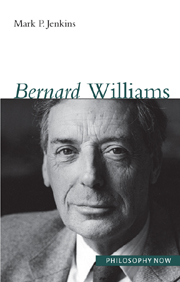Book contents
1 - Introduction: “Against the shortsighted”
Summary
According to his long-time friend and fellow philosopher Thomas Nagel, “Bernard Williams once posed the awkward question, What is the point of doing philosophy if you're not extraordinarily good at it?” (Nagel 1995a: 10). The idea seems to be that whereas the brilliant thinkers of, say, chemistry and physics require thought-corroborating minions, philosophy's brightest lights require few, if any, to reflect their glory: underlabourers need not apply. Nagel continues: “If you're not extraordinary, what you do in philosophy will be either unoriginal (and therefore unnecessary) or inadequately supported (and therefore useless). More likely, it will be both unoriginal and wrong” (ibid.). By such measures, Williams clearly counts as extraordinary (as does Nagel, for that matter), and this book documents that extraordinariness by presenting in detail both Williams's substantial original contributions to contemporary philosophy and their supporting arguments.
Nietzsche poses a different question. In Human, All Too Human, he asks “shortsighted” readers: “Do you think this work must be fragmentary because I give it to you (and have to give it to you) in fragments?” (Nietzsche 1986: 243). Williams might well ask this same question in connection with his own work, giving, of course, the same emphatic, if implicit, negative reply. In fact, Williams did suggest this very passage as a fitting epigraph for his life's work (personal conversation: 13 November 1996). Still, readers might be forgiven, at least initially, for seeing Williams’s contributions to contemporary philosophy as all too fragmentary, addressing, as they do, a vast array of areas, periods and problems in philosophy, most notably in ethics, where his views on a host of issues – metaphysical, political, epistemological, practical, psychological, historical – in a variety of voices – sceptical, critical, constructive, by turns positive and pessimistic – have proven especially influential.
- Type
- Chapter
- Information
- Bernard Williams , pp. 1 - 8Publisher: Acumen PublishingPrint publication year: 2006



